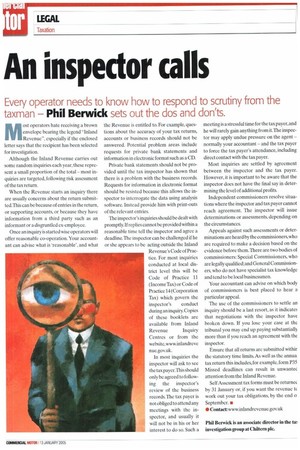An inspedor calls
Page 34

If you've noticed an error in this article please click here to report it so we can fix it.
Every operator needs to know how to respond to scrutiny from the
taxman — Phil Berwick sets out the dos and don'ts.
Most operators hate receiving a brown envelope bearing the legend "Inland Revenue", especially if the enclosed letter says that the recipient has been selected for investigation.
Although the Inland Revenue carries out some random inquiries each year, these represent a small proportion of the total — most inquiries are targeted, following risk assessment of the tax return.
When the Revenue starts an inquiry there. are usually concerns about the return submitted.This can be because of entries in the return, or supporting accounts, or because they have information from a third party such as an informant or a disgruntled ex-employee.
Once an inquiry is started wise operators will offer reasonable co-operation. Your accountant can advise what is 'reasonable', and what the Revenue is entitled to. For example, questions about the accuracy of your tax returns, accounts or business records should not be answered. Potential problem areas include requests for private bank statements and information in electronic format such as a CD.
Private bank statements should not be provided until the tax inspector has shown that there is a problem with the business records. Requests for information in electronic format should be resisted because this allows the inspector to interrogate the data using analysis software. Instead provide him with print-outs of the relevant entries.
The inspector's inquiries should be dealt with promptly. If replies cannot be provided within a reasonable time tell the inspector and agree a deadline:Die inspector can be challenged if he or she appears to be acting outside the Inland Revenue's Code of Practice. For most inquiries conducted at local district level this will be Code of Practice 11 (Income Tax) or Code of Practice 14 (Corporation Tax) which govern the inspector's conduct during an inquiry. Copies of these booklets are available from Inland Revenue Inquiry Centres or from the website,www.inlandreve nue.gov.uk.
In most inquiries the inspector will ask to see the tax payer.This should only be agreed to following the inspector's review of the business records. The tax payer is not obliged to attend any meetings with the inspector, and usually it will not be in his or her interest to do so. Such a meeting is a stressful time for the taxpayer, and he will rarely gain anything from it. The inspector may apply undue pressure on the agent — normally your accountant — and the tax payer to force the tax payer's attendance, including direct contact with the tax payer.
Most inquiries are settled by agreement between the inspector and the tax payer. However, it is important to be aware that the inspector does not have the final say in determining the level of additional profits.
Independent commissioners resolve situations where the inspector and tax payer cannot reach agreement. The inspector will issue determinations or assessments, depending on the circumstances.
Appeals against such assessments or determinations are heard by the commissioners, who are required to make a decision based on the evidence before them. There are two bodies of commissioners: Special Commissioners, who are legally qualified; and General Commissioners, who do not have specialist tax knowledge and tend to be local businessmen.
Your accountant can advise on which body of commissioners is best placed to hear a particular appeal.
The use of the commissioners to settle an inquiry should be a last resort, as it indicates that negotiations with the inspector have broken down. If you lose your case at the tribunal you may end up paying substantiall) more than if you reach an agreement with the inspector.
Ensure that all returns are submitted withir the statutory time limits. As well as the annua tax return this includes, for example, form P35 Missed deadlines can result in unwantec attention from the Inland Revenue.
Self Assessment tax forms must be returnee by 31 January or, if you want the revenue te work out your tax obligations, by the end oSeptember. • • Contactwww.inlandrevenue.gov.uk






















































































































































































